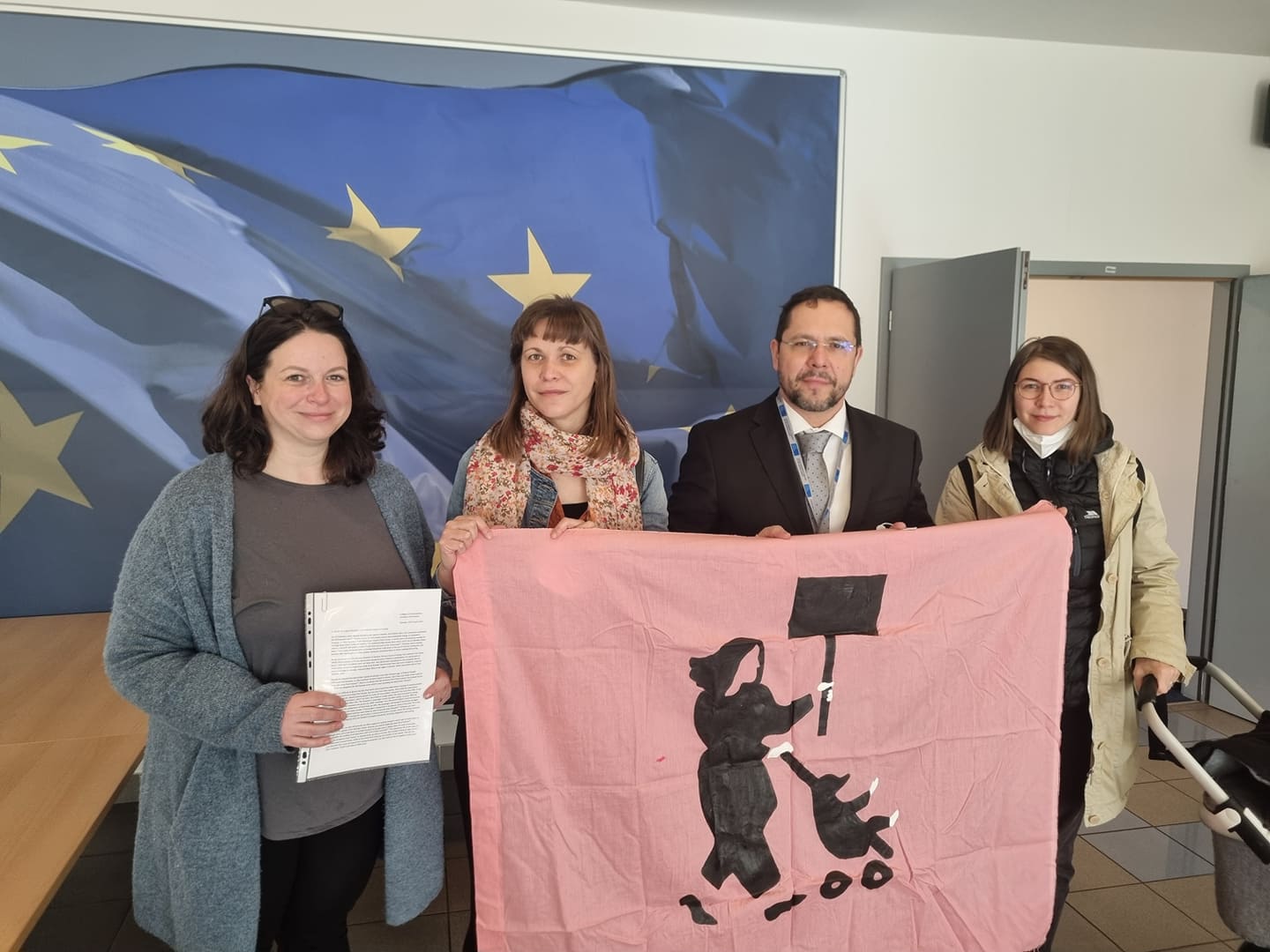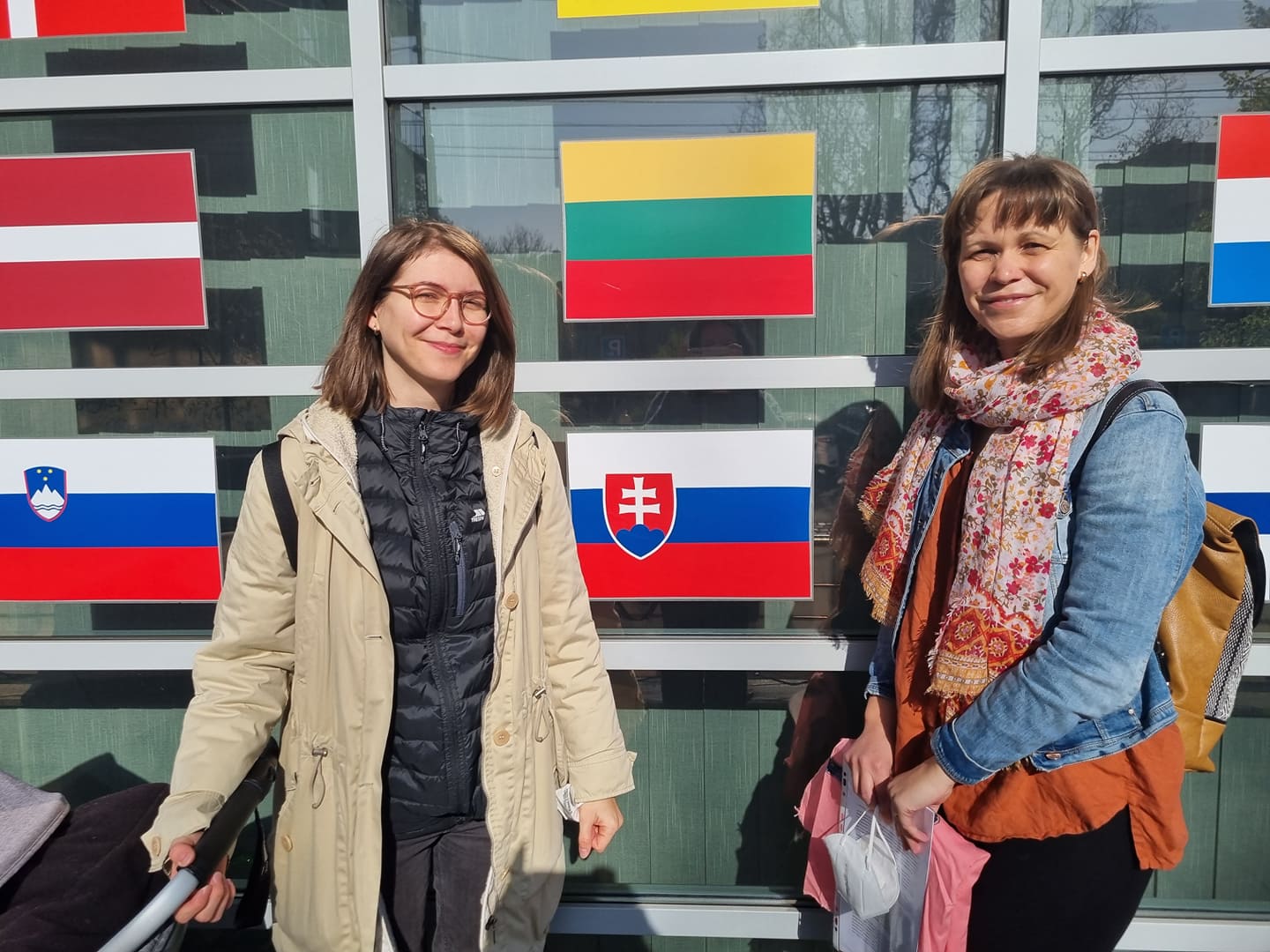
Znepokojené matky odovzdali zastúpeniu Európskej komisie na Slovensku otvorený list európskych klimatických iniciatív, v ktorom žiadajú obmedzenie importu ruskej ropy.
Len za rok 2021 krajiny Európskej únie zaplatili Rusku 140 miliárd EUR za import ropy, čo je trikrát väčšia suma, ako platíme za ruský plyn. Európska únia už v tomto momente pracuje na pláne obmedzenia ruského plynu (REPower Europe). Európske klimatické iniciatívy preto žiadajú Európsku komisiu o urýchlené prijatie obdobných plánov aj pre ropu.
Vojenská agresia Ruska voči Ukrajine dáva nový rozmer už “tradičným” požiadavkám klimatických aktivistov. Najrýchlejšou cestou, ako obmedziť import ruskej ropy a znížiť náš podiel na financovaní vojny, je znižovanie spotreby ropy samotnej. Toto je možné docieliť podporou alternatívnych spôsobov dopravy, ako vlakov, bicyklov alebo peších presunov. Medzi konkrétnejšie návrhy patrí napríklad integrácia vlakovej a bicyklovej prepravy (aj naprieč krajinami), či zavedenie parkovacej politiky v mestách.
S iniciatívou otvoreného listu prišlo rodičovské združenie v Poľsku (Rodzicze dla Klimatu), a veľmi rýchlo ju podporili aj ďalšie národné klimatické skupiny; celkovo vyše 50 organizácii z 15 krajín. Zároveň 13.4. prebiehalo osobné odovzdávanie listu vo viacerých krajinách – okrem Slovenska aj v Poľsku, Nemecku a Rakúsku.
Plné znenie listu nájdete nižšie.
A call for an urgent limitation of crude oil imports to Europe
Warsaw, 13th of April 2022
On 24 February 2022, Russia started a war against Ukraine. On 8 March 2022, the Commission presented the REPowerEU plan[1] of joint action for affordable, secure and sustainable energy. It contained a strategy for moving away from natural gas imports from Russia. A similar plan is immediately needed for moving away from crude oil imports. The statistical data clearly show that in 2021 the EU Member States paid Russia EUR 140 billion, almost three times as much as for natural gas[2]. The basic task in moving away from crude oil combustion in Europe should be a decrease in the use of internal-combustion cars and aircraft. Particularly in cities, braver measures should be taken to foster walking and cycling.
As demonstrated by the Russian invasion of Ukraine, the purchases of energy raw materials from States which fail to comply with the democratic standards pose a threat to world peace. It is particularly in Russia that such standards have not been met. Still, democratic standards are not complied with by many other countries exporting crude oil to Europe. Recent years have seen wars funded by crude oil sales to Europe in Georgia, Iraq and Libya. Now a war rages in Ukraine. When and where will we fund another one?
Russia abandoned the democratic standards already more than 20 years ago. In Poland, Finland, Lithuania and Slovakia, i.e. the countries situated closest to Russia, more than two thirds of the crude oil they use come from Russia[3]. There is no doubt that the revenues from these exports have helped Russia to fund the weaponry for the Russian army which is now bombing the democratic Ukraine[4].
Today, it is difficult to ignore the fact that much more could have been done in Europe to avoid excessive crude oil imports to Europe from Russia, but not only from that country. Since 1995 the road and air transport of goods, almost entirely based on crude oil consumption, has grown by more than 50%. In the same period, rail transport, which has been electrified to a large extent, has only increased its energy consumption by less than 15%. The situation in passenger travels has been similar, as since 1995 the fossil fuel-based air transport has grown by 140%. Passenger cars, the second largest crude oil consumer, have increased the combustion of fossil fuels by 30%. The passenger rail transport has barely managed to keep its share in the total number of passengers transported in Europe at a level of less than 7%. It has given way to air transport and has even failed to start to pursue road transport[5]. Railways can carry many more passengers and goods, particularly in Central and Eastern Europe, where the railway network has not been fully aligned with the Western European standards, including integration with cycling travels.
In European cities, we also still provide too little support to cycling transport which uses no fossil fuels. In as many as 17 capitals of EU Member States, bicycles are used to make less than 5% of travels[6], although even such a low level of cycling transport in Europe saves 3 billion litres of crude oil annually and prevents the funding of oil exporters with EUR 4 billion annually[7]. This represents 5% of the value of the crude oil exports from Russia. In densely built-up cities in Europe, the number of bicycle rides can be increased even several times, while at the same time reducing the number of car travels. This will not only diminish the crude oil imports for transport purposes, but also improve the air quality in cities and their residents’ health and reduce traffic jams.
In light of this, we would like to express our astonishment at the fact that the European Commission has failed to present, along with its vision for moving away from natural gas imports from Russia, an ambitious plan for shifting away from crude oil imports, particularly in the transport sector. We call for the preparation and implementation of such a plan as soon as possible. In our opinion, the plan should contain the following core elements:
- A detailed review of the laws and actions of EU Member States in the scope of the legislation and funding of the particular transport modes in terms of the combustion of fossil fuels, along with the issue of binding and detailed recommendations for the directions of improvements in the situation, as part of the European Semester.
- Scaling up the measures to limit car traffic in urban agglomerations by using legal and financial instruments, such as: clean transport zones, restricted car traffic zones, lower speed limits and parking charges corresponding to the real costs of space occupation.
- Specific requirements for scaling up of investments in cycling, tramway and railway infrastructure and buses. These transport modes foster the development of cities in their compact form, thus improving their energy efficiency.
- Increasing the outlays and enabling easier public funding of passenger railway transport and investments in railway connections in urban agglomeration and outside them, particularly in order to integrate the railway systems of different Member States. Such measures are needed, in particular, in Central and Eastern Europe, where passenger and goods railway connections are often fragmentary.
In order to stop the Russian attack against Ukraine, ad hoc saving measures are now necessary, too. We call on the European Commission to use its information channels to encourage the residents of Europe, for the sake of Ukraine and our joint security, to limit their use of cars, increase the frequency of their bicycle rides and take longer walks. We call on the European Commission to remind employers of the need to maintain a higher level of remote work. We call on the European Commission to use its information channels to encourage the authorities of European countries and cities to scale up the restrictions on car traffic, among others, by organising car-free Sundays, and to facilitate instead walking, cycling and the use of public transport.
[1] https://ec.europa.eu/commission/presscorner/detail/en/ip_22_1511
[2] Source: UN Comtrade trade data, after https://beyond-coal.eu/russian-fossil-fuel-tracker/
[3]https://businessinsider.com.pl/gospodarka/energia-z-gazu-mapa-krajow-uzaleznionych-od-rosji/tvvsrqp
[4] https://www.transportenvironment.org/discover/how-russian-oil-flows-to-europe/
[5] EU Transport in figures 2020, European Commission Energy and Transport, https://op.europa.eu/o/opportal-service/download-handler?identifier=da0cd68e-1fdd-11eb-b57e-01aa75ed71a1&format=pdf&language=en&productionSystem=cellar&part=
[6]https://ecf.com/resources/cycling-facts-and-figures/capital-cities
[7]https://www.ecf.com/resources/cycling-facts-and-figures
_____________________________________
This call is supported by:
| Zielone Mazowsze | Poland |
| Rodzice dla Klimatu | Poland |
| Instytut na Rzecz Ekorozwoju | Poland |
| Nextbike Polska | Poland |
| Kyiv Bike City | Ukraine |
| Koalicja Klimatyczna | Poland |
| Pracownia na rzecz Wszystkich Istot | Poland |
| Fundacja EkoRozwoju | Poland |
| Bractwo Rowerowe | Poland |
| Bydgoska Masa Krytyczna | Poland |
| Rowerowa Gdynia | Poland |
| Polski Klub Ekologiczny Okręg Mazowiecki | Poland |
| Polski Klub Ekologiczny Okręg Pomorski | Poland |
| Green REV Institute | Poland |
| Future Food 4 Climate | Poland |
| Warszawski Alarm Smogowy | Poland |
| Lata Dwudzieste | Poland |
| Levegő Munkacsoport | Hungary |
| Grandparents For Future | Austria |
| Parents For Future Austria | Austria |
| Seniors For Future | Austria |
| Znepokojené matky | Slovakia |
| Rodiče za klima | Czechia |
| Parents For Future Italia | Italy |
| Parents For Future Germany | Germany |
| Parents For Future Oberhausen | Germany |
| Parents For Future Wuppertal | Germany |
| Parents For Future Berlin | Germany |
| Parents For Future Paderborn | Germany |
| People For Future Kiel | Germany |
| Parents For Future Jena | Germany |
| Parents For Future Gütersloh | Germany |
| Parents For Future Dresden | Germany |
| Parents For Future Oldenburg | Germany |
| Parents For Future Hannover | Germany |
| Parents For Future Augsburg | Germany |
| Parents For Future Netherlands | Netherlands |
| Grootouders voor het Klimaat | Netherlands |
| Mothers rise up | Netherlands |
| Grootouders voor het Klimaat | Belgium |
| Parents For Future Portugal | Portugal |
| Madres por el clima Canaries | Spain |
| Grands parents pour le climat | France |
| Grands-parents pour le climat/
Klimagrosseltern |
Switzerland |
| Parents For Furure Sweden | Sweden |
